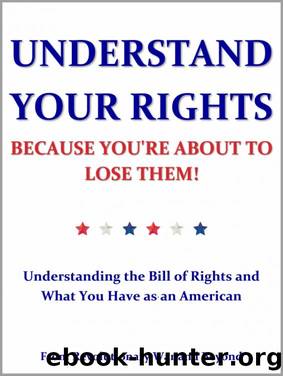Understand Your Rights Because You're About to Lose Them! by Revolutionary War & Beyond & Beyond

Author:Revolutionary War & Beyond & Beyond
Language: eng
Format: epub
Tags: supreme court, american history, us constitution, bill of rights, us government, american government, constitutional rights, american liberty, states rights, constitutional history
Publisher: Revolutionary War and Beyond
Chapter 10
The 7th Amendment
The 7th Amendment to the United States Constitution is part of the original Amendments to the Constitution that make up the Bill of Rights. The 7th Amendment guarantees an accused person of the right to have a trial by jury in most civil cases and also guarantees that facts decided by those juries cannot be reexamined at a later date. The right to trial by jury was mentioned three times in the Bill of Rights. It was clearly very important to America's Founding Fathers to be mentioned so many times.
The 7th Amendment reads like this:
"In Suits at common law, where the value in controversy shall exceed twenty dollars, the right of trial by jury shall be preserved, and no fact tried by a jury, shall be otherwise re-examined in any Court of the United States, than according to the rules of the common law."
Purpose of the 7th Amendment
The 7th Amendment was included in the Bill of Rights for several basic reasons. The American colonists had just endured a period of not being allowed jury trials by the British government. This grievance was mentioned by Thomas Jefferson in the Declaration of Independence. The British Crown had created separate courts for the colonists that did not allow juries to decide the cases. Why did the Crown do this? Because colonial juries were consistently rejecting British law and undermining the wishes of the King and Parliament.
As Parliament began to pass more and more oppressive taxes, colonists began to evade them more and more by smuggling. In response, Parliament made more and more effort to catch smugglers and try them and have them pay heavy fines. When colonial juries would meet to try the smugglers, they would often let them go free, even though they had clearly broken the law, in order to protest what they believed were unjust taxes in the first place.
This led to Parliament creating new courts that did not use juries at all, but were solely decided by royal judges. Of course, the royal judges usually ruled against the smugglers and the colonists were angered that they had lost the right to be tried by a local jury. Royal judges were even sometimes paid extra when they found accused smugglers guilty!
This use of juries to evade unjust laws was one of the colonists' ways of protecting themselves from the schemes of a tyrannical government and it reveals the second reason the Founders included the 7th Amendment in the Bill of Rights - trial by jury provides a bulwark for the people against the government.
Juries are not required to base their decisions on the wishes of government officials, but can choose to declare a person innocent of a crime he is accused of committing even if he is guilty. A jury would probably only do this, however, if it believed the law itself was unjust.
History of the 7th Amendment
Before the Revolution
The tradition of trial by jury began in England around the 12th century. Originally, juries were a group of twelve local men who were brought in to tell what they knew of the facts of a case.
Download
This site does not store any files on its server. We only index and link to content provided by other sites. Please contact the content providers to delete copyright contents if any and email us, we'll remove relevant links or contents immediately.
| Anthropology | Archaeology |
| Philosophy | Politics & Government |
| Social Sciences | Sociology |
| Women's Studies |
The Secret History by Donna Tartt(19092)
The Social Justice Warrior Handbook by Lisa De Pasquale(12191)
Thirteen Reasons Why by Jay Asher(8912)
This Is How You Lose Her by Junot Diaz(6889)
Weapons of Math Destruction by Cathy O'Neil(6281)
Zero to One by Peter Thiel(5802)
Beartown by Fredrik Backman(5759)
The Myth of the Strong Leader by Archie Brown(5509)
The Fire Next Time by James Baldwin(5449)
How Democracies Die by Steven Levitsky & Daniel Ziblatt(5219)
Promise Me, Dad by Joe Biden(5154)
Stone's Rules by Roger Stone(5088)
A Higher Loyalty: Truth, Lies, and Leadership by James Comey(4964)
100 Deadly Skills by Clint Emerson(4927)
Rise and Kill First by Ronen Bergman(4790)
Secrecy World by Jake Bernstein(4753)
The David Icke Guide to the Global Conspiracy (and how to end it) by David Icke(4720)
The Farm by Tom Rob Smith(4514)
The Doomsday Machine by Daniel Ellsberg(4490)
